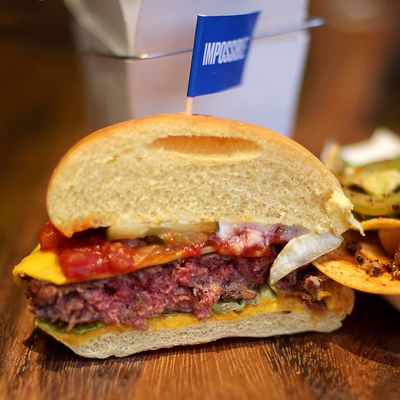
We’ve gotten to a point where lab-made “meat” is both ubiquitous and tasty, and the people who raise the animals used to make actual beef are, um, concerned. The U.S. Cattlemen’s Association, a powerful industry group, has officially gone on the offensive against the sea of food-tech start-ups that make convincing burgers and steaks without any actual cattle: companies such as Impossible Foods, Beyond Meat, Just (the start-up formerly known as Hampton Creek), and Memphis Meats, to name a few. Their first step in this fight: calling on the USDA to introduce a federal definition for both beef and meat that would exclude their competitors’ unorthodox products.
To give you a sense of how available high-tech meat substitutes have become: Whole Foods now sells Beyond Burgers right in the meat aisle — the kind of watershed that causes alarm for the USCA and NCBA. Ditto the fact that Tyson Foods and Cargill, America’s two largest meat-packers, have both recently invested in clean-meat start-ups. Tyson also announced a new line of plant-based ready-to-eat protein bowls called Green Street. And a recent survey also found that six in ten consumers are now purportedly cutting back on their meat consumption, and half of that group says the change will be “permanent.” Taken together, Big Beef sees these developments as potentially problematic.
So, a petition from the U.S. Cattlemen’s Association suggests that the government limit “beef” products to those that “come from cattle that have been born, raised, and harvested in the traditional manner.” The proposed definition seeks to specifically keep the term off of alternatives made from “plant, insects, or other non-animal components, and any product grown in labs from animal cells.”
The cattle industry is couching its fight as pro-consumer, with a separate lobbying group, the National Cattlemen’s Beef Association, arguing earlier this month that one of its duties is protecting innocent shoppers “from fake meat and misleading labels.” Interestingly, there is another group that seems okay with this potential move: the people making the meat substitutes. “I think it actually could help us more than it could hurt us,” Beyond Meat’s founder Ethan Brown tells USA Today, “because it starts the national dialogue around what really is meat, and if the origin of meat really matters to the consumer.”




